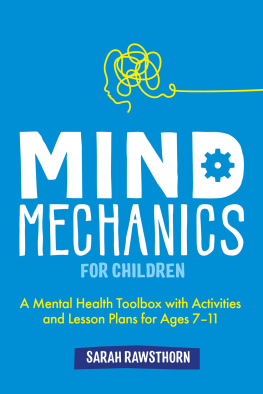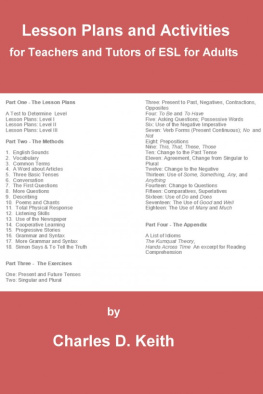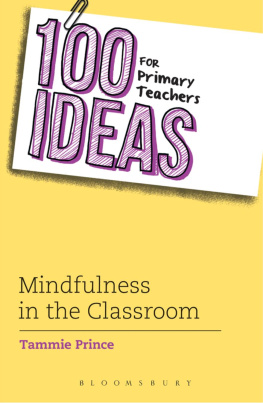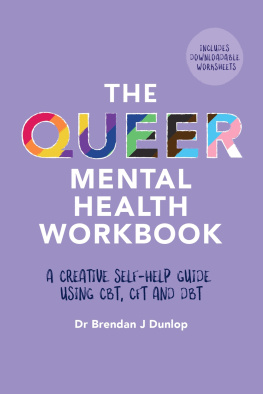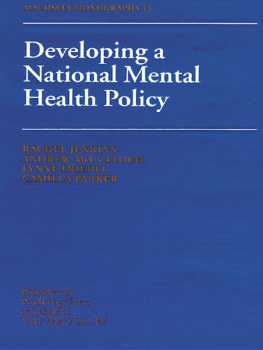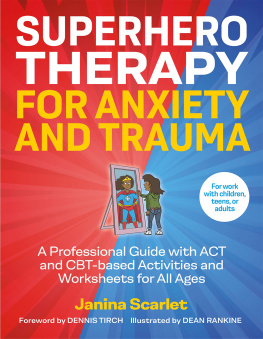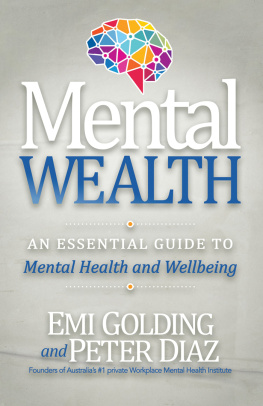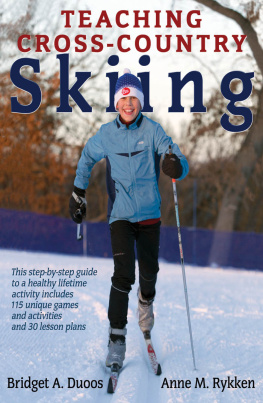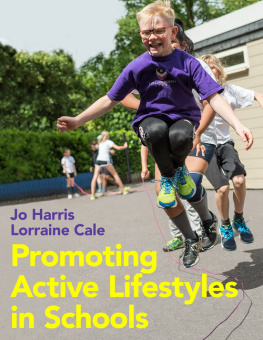Contents

Mind Mechanics
for Children
A Mental Health Toolbox with
Activities and Lesson Plans for Ages 711
SARAH RAWSTHORN

Contents
PART ONE
An Introduction to
Mind Mechanics
CHAPTER ONE
Why Teach about Mental Health
and Emotional Wellbeing Issues?
It is shocking to learn that suicide has now replaced accidents as the biggest killer of teenagers and those aged under 25.
It is becoming apparent to everyone that mental health is as important a part of life as physical health and we need to learn and teach how to protect our mental health. Physical education lessons are often compulsory in schools because we view physical health as something our children need to learn about. We teach them about eating healthily and staying fit. Pre-school children know that if they have a cut a plaster will protect them; they understand that they should brush their teeth and wash their hands. We all have physical health. Sometimes we are well and healthy, sometimes we have poor physical health. We try our best to protect our physical health but what about our mental health?
As with physical health, there are actions that we can take to keep ourselves mentally well. However, children are not routinely taught to understand mental health, nor how to manage and protect themselves. Poor mental health is something that everyone deals with at some point in their life, perhaps seeking help with mental illness, helping someone else, or simply dealing with stressful and challenging times and situations.
As educators we need to portray mental health as crucial and equally important as physical health (because it is) and that starts with making mental health education available.
Mental health education helps to keep the children and young people in our schools safe and enables them to better access the educational opportunities we make available to them, to achieve to the best of their ability so that they are better equipped for life: Teaching wellbeing in schools will improve the lives of young people and drive up test results. Additionally, talking openly with children and young people about mental health issues is a simple and effective means of breaking down any possible associated stigma.
Teaching about mental health and emotional wellbeing may raise significant challenges for teachers, however. We know that schools want to cover these issues and recognise the imperative to do so, but without sufficient knowledge and teaching resources, teachers may find it daunting. Mind Mechanics is the solution.
CHAPTER TWO
Introducing Mind Mechanics
Who, How and What?
This book is aimed primarily at education and mental health professionals working with children of the chronological or developmental age of 7 to 11. Although we think that a range of people who work with children, young people and their families will find it a very useful tool, a professional background in education, child development, psychology or mental health is advantageous.
The full Mind Mechanics programme consists of a series of lesson plans with over 15 hours of evidence-based, high-impact activities and photocopiable/downloadable resources.
This Mind Mechanics book can be used very flexibly, in any of the following ways:
As a universal whole school scheme of work: The Mind Mechanics programme can be used in its entirety as the scheme of work for Mental Health Education as a key part of your settings Personal Social, Health and Citizenship or Social and Emotional Learning curriculum: a universal teaching resource for all students. The programme in is arranged into six workshops, including an introductory workshop, followed by five themed workshops that each contain approximately two hours of content, as follows: 1) Introducing Mind Mechanics to Participants Including Pre-Intervention Assessment; 2) Emotions; 3) Calming Techniques and Liking Yourself; 4) Resilience and Self-Soothing; 5) Identifying Signature Strengths; 6) Using Signature Strengths and Support Networks and Post-Intervention Assessment. Each two-hour workshop can be split into shorter activities, over a number of different sessions if needed, permitting maximum flexibility in use.
As a targeted intervention for a group or individual: The programme can be used as a targeted resource for those children identified as being vulnerable or with a diagnosed mental health condition. You may wish to select particular activities to create a bespoke mental health curriculum or intervention to meet specific need.
As a resource bank of individual activities: To aid you in selecting particular activities to use as and when you choose, suggested timings for each activity are given in the content outline at the start of the workshop plans, and those activities most suited to being used individually are denoted with an asterisk.
Please note that once the introductory session has been covered, it is not imperative to complete the themed activities in order nor to adhere to the advisory time limits; these are simply for guidance and will depend on the number of participants.
ASSESSMENT AND IMPACT
The programme includes an introductory session, assessing both the childrens prior knowledge and skills in the field of mental health and taking a snapshot of the mental health of individual participants through standardised assessment tools.
The final workshop recaps on learning and assesses progress using the same assessment tools post-intervention. By using the pre- and post-intervention assessment tools at your first and last sessions, you will be able to measure the progress of individual children and use these assessments to target further intervention, or evidence need, when making referrals to specialist mental health services.
For further information with regard to the efficacy of the programme and how you will be able to use these tools to evidence impact in your setting, please see Appendix: Impact Data and Case Study.
For those children who developmentally are emotionally skilled and literate, you may wish to consider using the Mind Mechanics for Teens and Young Adults book from the Mind Mechanics for Mental Health series to extend their skills and knowledge.
RESOURCES
All resources required are listed and should be readily available in school. Many resources are created by the participating students as part of the activity plans, and templates and photocopiable sheets are included. The photocopiable resources are also available to download from https://library.jkp.com/redeem using the code CMTVFUL. Every child should make or be provided with a homemade cardboard toolbox (or commercially sold mini toolbox) that they can keep their resources from each weeks workshop in to use as and when they need them during the day.
WHAT IS MIND MECHANICS?
Mind Mechanics is a mental health education programme developed through collaboration between our specialist teachers, psychologists and counsellors, each bringing expertise, a breadth and depth of professional knowledge and passion for change. The skills, strategies and understanding necessary to maintain good mental health are delivered through classroom-based activities designed to facilitate better understanding and self-regulation of emotions. This will help to reduce mental health problems and teach strategies to better manage or protect against existing poor mental health. The result will be an improvement in life chances for participants, reducing escalation of need and demand on specialist providers.

